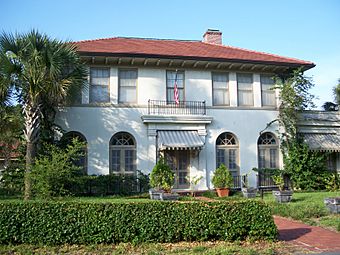Interlaken Historic Residential District facts for kids
Quick facts for kids |
|
|
Interlaken Historic Residential District
|
|
 |
|
| Location | Winter Haven, Florida |
|---|---|
| Area | 300 acres (1.2 km2) |
| NRHP reference No. | 02000266 |
| Added to NRHP | March 28, 2002 |
The Interlaken Historic Residential District is a special neighborhood in Winter Haven, Florida. It's known for its beautiful old homes. This area was officially recognized as a historic district on March 28, 2002. This means it's a place with important history and buildings worth protecting.
Contents
Exploring the Interlaken Neighborhood
The Interlaken neighborhood covers about 300 acres (1.2 square kilometers). Its name, "Interlaken," means "between lakes." This is because it is surrounded by the many lakes and canals of the famous Chain of Lakes.
Where is Interlaken Located?
The main borders of this neighborhood are:
- The north shore of Lake Howard.
- The southwest shore of Lake Mirror.
- The Cannon-Howard Canal.
Historic Homes of Interlaken
Interlaken is a neighborhood made up only of single-family homes. Many of these homes are very old and beautiful.
Homes on the National Register
More than two-thirds of the homes in Interlaken are considered historic. This means 50 homes in total are listed on the National Register of Historic Places. Most of these special homes were built between 1910 and 1924. A few were built a bit later, up to 1949. These houses are admired for their elegant look. They are great examples of the Colonial Revival architectural style.
Interlaken Park: A Community Space
Interlaken Park is a small public park located within the neighborhood. You can find it at Avenue L and Orange Street.
The Park's Interesting History
The land where the park now sits was originally planned for a house. However, during the 1920s, land prices in Florida went very high. Then, the prices crashed during the Florida land bust of 1925. This was followed by the Great Depression, a time when the economy was very bad.
Dr. Willey Terrell Simpson, who lived nearby, bought the land. He purchased it for a much lower price during the Depression. He then generously gave the land to the city. He wanted it to be used as a public park for everyone. It is the only piece of land in the neighborhood not used for a single-family home. Today, the park offers open green space and picnic areas for the community.
Gallery
 | John T. Biggers |
 | Thomas Blackshear |
 | Mark Bradford |
 | Beverly Buchanan |





